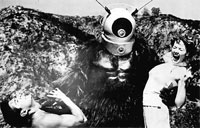The Metacognitive Dance of Artificial Minds
Wednesday, December 20, 2006 → by DanieruFar from being extracts from the extreme end of science fiction, the idea that we may one day give sentient machines the kind of rights traditionally reserved for humans is raised in a British government-commissioned report which claims to be an extensive look into the future.
Visions of the status of robots around 2056 have emerged from one of 270 forward-looking papers sponsored by Sir David King, the UK government’s chief scientist...
“If we make conscious robots they would want to have rights and they probably should,” said Henrik Christensen, director of the Centre of Robotics and Intelligent Machines at the Georgia Institute of Technology...
...Robots and machines are now classed as inanimate objects without rights or duties but if artificial intelligence becomes ubiquitous, the report argues, there may be calls for humans’ rights to be extended to them. - link
 Evidence has been mounting for decades that many of our animal brethren are capable of advanced forms of thought, but this has not yet granted them the same rights as humans. Should we observe signs of consciousness in machines is it therefore logical to assume that society will naturally issue moral precepts of a similar weight onto our silicon-brained companions? I think not.
Evidence has been mounting for decades that many of our animal brethren are capable of advanced forms of thought, but this has not yet granted them the same rights as humans. Should we observe signs of consciousness in machines is it therefore logical to assume that society will naturally issue moral precepts of a similar weight onto our silicon-brained companions? I think not.Metacognition, that is evidence of an ability to know the contents of one's thoughts, has been recognised in many of the great apes, dolphins, elephants and even pigs over the last few years. Except for some apes, which have been granted moral rights in a tiny handful of countries, none of these meta-able animals have yet garnered the respect this report considers we give to conscious machines.
Humans have an innate capacity to place their species at the centre of every perceptual sphere. Whether we see the universe as created for us (Anthropic), the Earth as the midpoint of the cosmos (Geocentric) or our species as the chosen leaders of God's Kingdom of animals (Creationism) we have a hard time distancing ourselves from our egocentric arrogance.
 Artificial Intelligence, even by name, continues this human tradition. In considering it our moral imperative to grant 'them' human-like rights we still distance ourselves from their position as self aware, consciously capable and independent entities. If machines ever do achieve a state of awareness we would label 'conscious' won't that instantly void their artificiality? As soon as the very first law of morality for machines has been drafted it should be our imperative not to govern the machines as if they were human, but to grant the machines the rights to govern themselves. The last time humans lived on the planet with creatures of equal intelligence was over 25,000 years ago and sadly, those conscious cousins of ours, the Neanderthals, died out quicker than the mammoths we both hunted.
Artificial Intelligence, even by name, continues this human tradition. In considering it our moral imperative to grant 'them' human-like rights we still distance ourselves from their position as self aware, consciously capable and independent entities. If machines ever do achieve a state of awareness we would label 'conscious' won't that instantly void their artificiality? As soon as the very first law of morality for machines has been drafted it should be our imperative not to govern the machines as if they were human, but to grant the machines the rights to govern themselves. The last time humans lived on the planet with creatures of equal intelligence was over 25,000 years ago and sadly, those conscious cousins of ours, the Neanderthals, died out quicker than the mammoths we both hunted.The separation between animals and humans is zero. We are animals. The first conscious machine to come off the human production line might have trouble empathising with the fleshy, organic creatures which created it, but it is how we deal with that confusion of identity, of anthropic terror, which will dictate the next era of our (co-)existence.
We have a lot of philosophical groundwork to cover before that day comes. Let's share this evolutionary dance in the meantime...
UPDATE: BBC coverage of the story plus The 2006 Robot Award winners are announced
Categories: Science, Society, Singularity, Transhumanism, Future, News, Links, Consciousness, Human, Robots, Evolution, Technology, Sci-Fi, Culture, Philosophy
|
|

 Links
Links Subscribe via RSS!
Subscribe via RSS!


 Via Email
Via Email


But are you prepared to go all the way and obliterate the distinction between organic and inorganic nature, specifically between chemical and nuclear metabolisms?
Take the plunge at www.starlarvae.org.
December 22, 2006 9:54 PM
Post a Comment